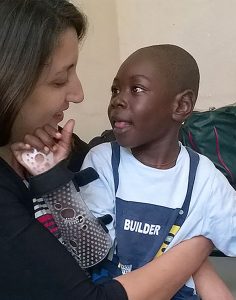 Israeli article: The Israeli Women Who Bring Electricity, Agriculture And Affordable Healthcare – To The World’s Poorest Countries
Israeli article: The Israeli Women Who Bring Electricity, Agriculture And Affordable Healthcare – To The World’s Poorest Countries
(We translated a part of the article: the interview with Tamar Ish-Cassit, Cassit Orthopedics CEO, founder and designer):
Cassit Orthopedics – improving life in five minutes
“Social Design”, is how Tamar Ish-Cassit (36) calls her business. When she met in one of her visits in Kenya with the Department of Industrial Design at the University of Nairobi, it was the first time they have heard about this concept. “I asked them how can it be,” she says. “I told them – in your community there are millions of people with disabilities, aren’t they consumers? While I have to fly here, to sell them medical and rehabilitation supplies, you live here – grasp this advantage and design accessible solutions for your own community.”
For example, telling Ish Cassit, the price of a hand splint (accessory support for orthopedic treatment for a disability) in Kenya is about $50 on average, and lasts between one and two years. “In contrast”, she says, “using the technology in which our company uses, the average selling price for the end customer is $15 and the splint lasted at least five years.” The price still contains its profit to its producer, and according to Ish-Cassit – this is the heart of a social business, which is both profitable and has positive impact. “My passion is to change the world, improve people’s lives and enable them to live independently and happily. From a business perspective, I want to produce a quality product to the masses at low cost plus a fair profit. This is precisely the definition of social business – a combination of high profit potential with a huge impact on society” she explains.
Ish-Cassit is a 36-year-old industrial designer and entrepreneur. In the last six years, she is the director of industrial design company that specializes in designing and manufacturing unique solutions for people with disabilities, called “Cassit Studio”. This year she has set up a second company, “Cassit Orthopedics”, which develops and manufactures affordable medical equipment to people from lower socioeconomic backgrounds, who live in developing countries. Through Cassit Orthopedics, Ish-Cassit develops orthopedic support accessories for upper extremities, called splints, “and often allow people to use their hands for the first time in their lives. By virtue of being a medical product, they also retain motor skills and prevent deterioration of the movement ability, and are sold at an affordable price”, as she describes. Ish-Cassit count the many benefits she integrates with these splints “high-quality, accessible, affordable, attractive appearance and long lasting durable product.”
The splints of Ish-Cassit seek to answer another problem. In Kenya there are 17 doctors per 100 thousand people, a lower rate in relation to the world. For example, in Israel with approximately 350 physicians per 100 thousand inhabitants. Therefore, one of the challenges of medical personnel in Kenya is the short time they can devote to each patient. “Our splint also seeks to solve this problem,” she says, “now days it takes on average 45 minutes to prepare and adjust a splint for one patient, while our splint is already in various sizes and types, and allows full and easy customization in five minutes tops.”
When Ish Cassit visited rural areas in Kenya, she was surprised to discover that the large companies are not there – there is a severe shortage of medical equipment in the rural areas. “Almost no suitable materials for making splints and assistive devices for people who really need them. In addition, due to the lack of access to information, many people are not aware of the existence of solutions and suffer from exclusion and prejudice”. Thus, she sees the affordable medical equipment which she develops and sells, as a world’s key to social upheaval, no less. “In our world, people with disabilities are often a captive and utilized market. We want to design the new medical equipment so that it is accessible to many. This is due not only for moral reasons, but also from the business understanding that there is a need to match the price to the economic capacities of the target audience.”
Netta Ahituv, The Marker Magazine, 6/7/2016
For the full article and pictures (Hebrew): http://www.themarker.com/themarker-women/1.2998657
